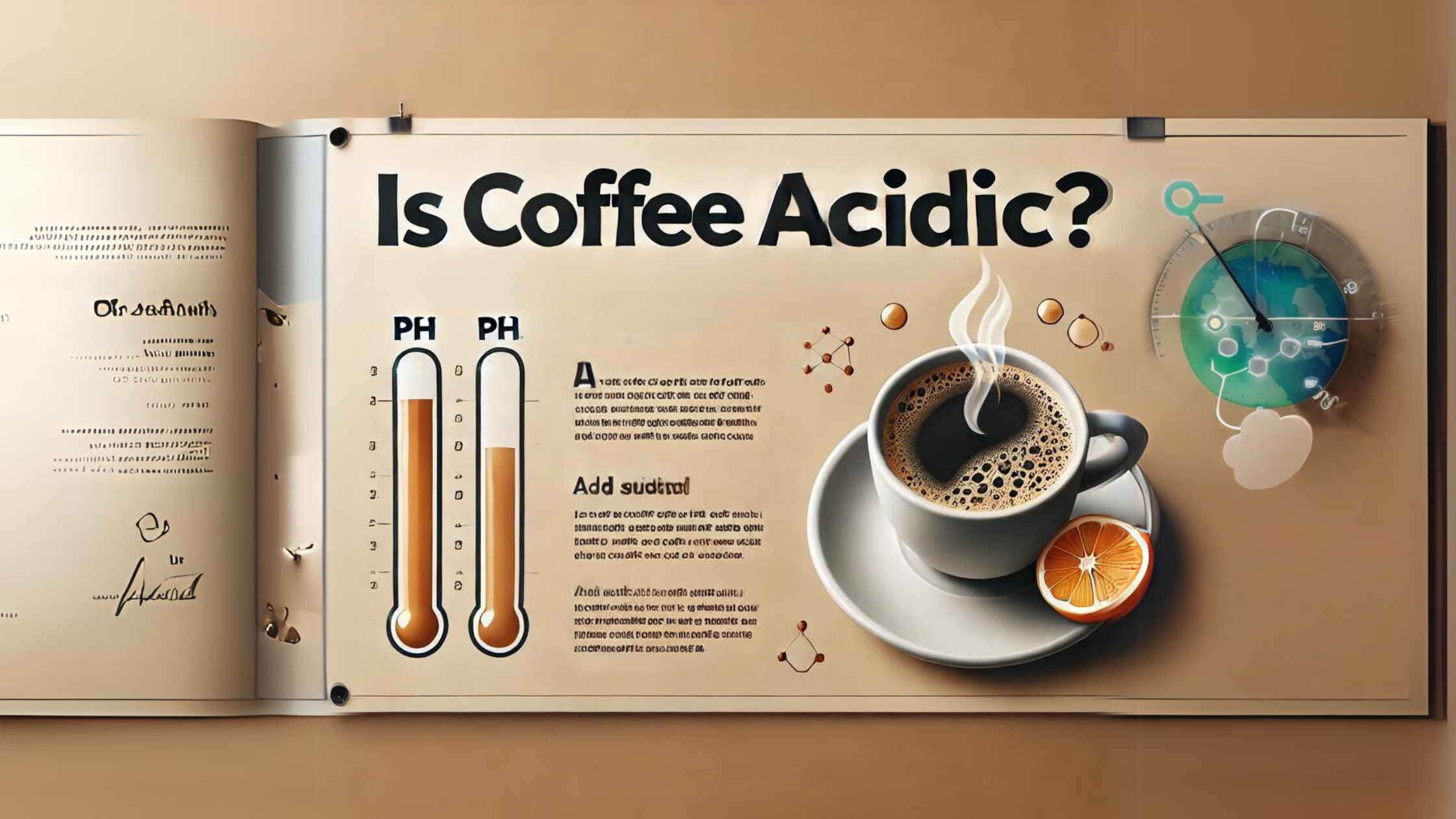Table of Contents
ToggleIs Coffee Acidic?
Yes, coffee is acidic, but not as acidic as some other beverages. Coffee’s pH level typically falls between 4.85 and 5.10, which is considered mildly acidic. The acidity comes from natural compounds found in the coffee beans, like chlorogenic acid and caffeine. For reference, pure water has a neutral pH of 7, while highly acidic drinks like orange juice and soda have a pH as low as 2.5 to 3.5.
How Does Coffee’s Acidity Affect You?
For some people, the acidity in coffee enhances its bright and tangy flavor, contributing to the unique taste we enjoy. However, others—especially those with acid reflux or sensitive stomachs—might find that coffee’s acidity can cause discomfort. In fact, about 20% of Americans experience acid reflux at least once a week, and coffee can sometimes worsen these symptoms.
Although coffee is less acidic than drinks like orange juice or soda, the acidic compounds can still lead to heartburn or stomach upset for some individuals. The acidity also adds to coffee’s overall flavor profile, making it taste more complex, sharp, or even a bit sour, depending on how it’s brewed.

20% of Americans experience acid reflux at least once a week. Coffee, due to its acidity, can sometimes trigger or worsen symptoms in individuals who are prone to heartburn or acid reflux.
How Acidic is Coffee Compared to Other Drinks?
The level of acidity in coffee can vary depending on how it’s brewed and the roast used. For example, cold brew coffee is often less acidic than traditional hot brewed coffee because the cold water extracts fewer acidic compounds from the coffee beans. Dark roasts are also less acidic than lighter roasts because the roasting process breaks down many of the acids present in the beans.
When comparing coffee to other common drinks, it falls in the middle. Soda, for example, has a pH level around 2.5, making it much more acidic than coffee. Even fruit juices like orange juice, which have a pH around 3.5, are more acidic. Coffee, with a pH of around 5, sits closer to drinks like black tea.
How to Reduce Coffee Acidity
If you’re sensitive to acidity, there are several ways you can reduce the acid in your coffee. Here are a few easy methods:
- Choose low-acid coffee blends: These coffees are specially made to have lower levels of acid.
- Opt for dark roast coffee: Darker roasts tend to have less acidity because the roasting process breaks down acidic compounds.
- Cold brew your coffee: Cold brewing extracts fewer acids, making the final cup smoother and less likely to cause acid reflux.
- Add milk or cream: Dairy can neutralize some of the acids in coffee, making it gentler on the stomach.
- Use a pinch of baking soda: Adding a small pinch of baking soda to your coffee can help reduce its acidity without changing the flavor.
- Switch to Arabica beans: Arabica beans are naturally lower in acidity than Robusta beans, which are commonly used in stronger, more bitter coffee blends.
Is Decaf Coffee Less Acidic?
A common question is whether decaf coffee has less acidity than regular coffee. Surprisingly, decaf coffee usually has a similar pH level to its caffeinated counterpart. However, some people find decaf easier on their stomachs, likely because the caffeine—which can also irritate the stomach lining—is removed during the decaffeination process.
That being said, decaf coffee may still cause issues for some people with sensitive stomachs or acid reflux. If you want to enjoy coffee without the acidity, you’re better off focusing on the brewing method and type of roast rather than just switching to decaf.


64% of Americans drink coffee daily, making it one of the most popular beverages in the country. With many coffee drinkers managing acidity issues, there’s a growing demand for low-acid coffee options and gentler brewing methods.
Best Coffee Choices for Sensitive Stomachs
If you frequently experience stomach discomfort or heartburn after drinking coffee, there are specific options you can try:
- Low-acid coffee brands: Some coffee brands offer beans that are grown or processed to be less acidic. These coffees are great for people who need a gentler brew.
- Cold brew coffee: As mentioned earlier, cold brewing extracts fewer acids, making the coffee less likely to irritate your stomach.
- Dark roast coffee: The longer roasting process of dark roasts breaks down acids, making the coffee smoother and less acidic.
- Arabica beans: Arabica beans are generally less acidic than Robusta beans, which are often used in stronger, more bitter coffee blends.
Conclusion: Is Coffee Acidic?
In conclusion, coffee is acidic, but the level of acidity can be managed. By selecting the right beans, roast, and brewing method, you can enjoy coffee without worrying too much about its effects on your stomach. Coffee has a pH level around 5, making it less acidic than many common beverages. If you’re one of the 64% of Americans who drink coffee daily, these tips can help you find a brew that suits your taste without causing unnecessary discomfort.
Analogy
Think of coffee’s acidity like the sourness of a lemon. Some people love the sharp, bright taste, while others find it overwhelming. Just as you might add sugar to balance out the sourness in lemonade, you can adjust coffee’s acidity by using different brewing methods or adding milk to make it smoother.
FAQs
1. What is the pH level of coffee?
Coffee typically has a pH level between 4.85 and 5.10, making it mildly acidic.
2. Is decaf coffee less acidic than regular coffee?
No, decaf coffee has a similar pH to regular coffee, but some people find it easier on their stomachs because it doesn’t contain caffeine.
3. Can cold brew coffee help reduce acidity?
Yes, cold brew coffee is often less acidic because the cold water extracts fewer acidic compounds during brewing.
4. What type of coffee is best for sensitive stomachs?
For sensitive stomachs, low-acid coffee, dark roasts, cold brew, and Arabica beans are the best options.
5. Does adding milk reduce coffee acidity?
Yes, adding milk or cream can help neutralize some of the acids in coffee, making it gentler on the stomach.







